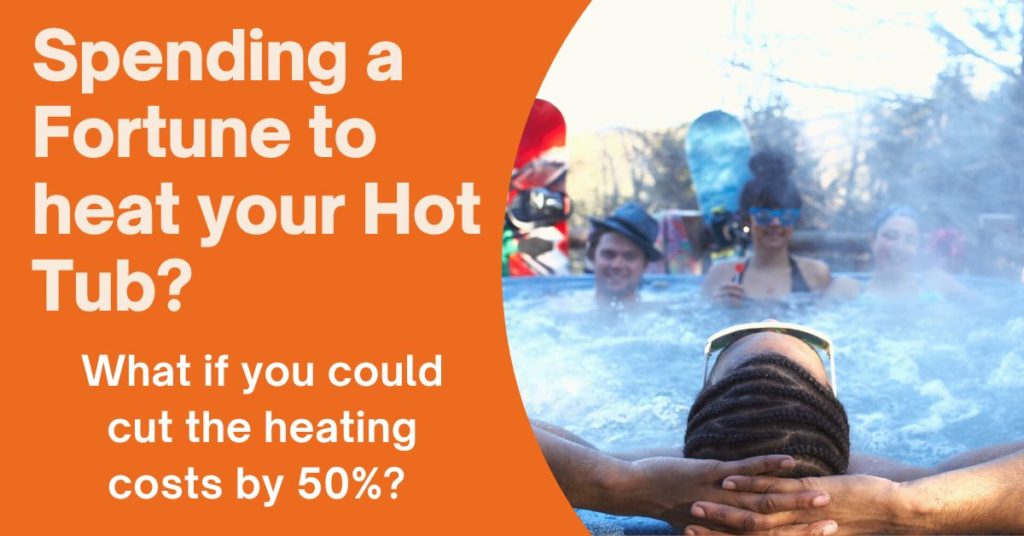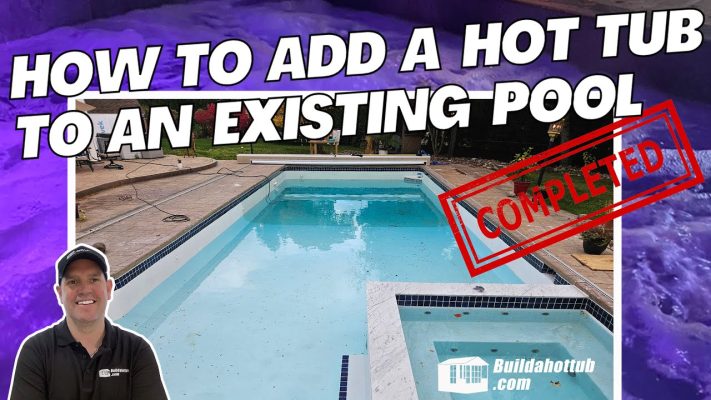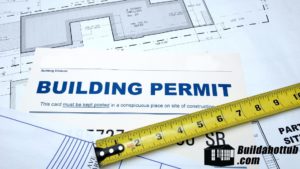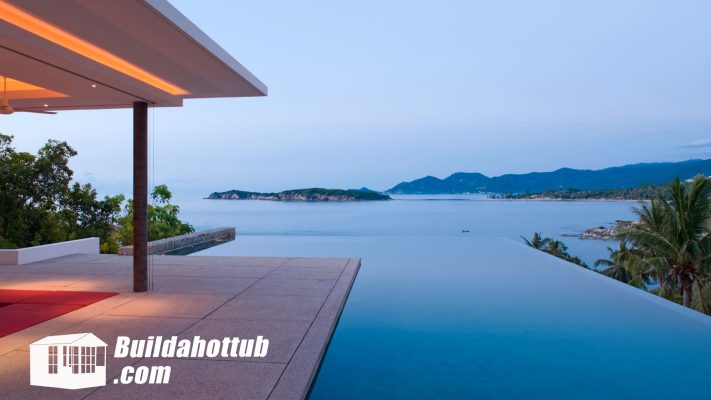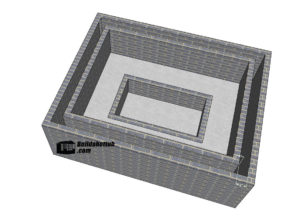With the increase in electricity prices all over the world, we’re all looking for alternative ways to heat our hot tubs. Air Source Heat Pumps are a great way to reduce the cost of your hot tub and allow you to keep using them even after the utility price hikes.
Don’t decommission your hot tub because of the fuel price rise, make it “price hike proof” with an Air Source Heat Pump.
In this article, I will go through step by step the things you need to do in order to fit an air source to your own hot tub.
Just putting this out there at this stage, you will get an ROI in 12 months or so. Also, I personally benefitted from 65% reduced costs and 8x heat up time.
You can read about that here https://buildahottub.com/reduced-hot-tub-costs/
Invalidate Hot Tub Warranty
The first thing that I must stress is that you are going to invalidate any manufacturer’s warranty on your hot tub in doing this.
That said, to be honest, if you can fit one of these yourself, you don’t need your manufacturer’s warranty as you can service it yourself!
The Myths around Hot Tubs and Air Source Heat Pumps
I want to deal with some of the myths surrounding air source heat pumps and the use on hot tubs.
Myth number 1 – they don’t work and it is not possible. Wrong! I have fitted one to my own tub and it 100% works.
Myth number 2 – they don’t get up to 40C or 102F – Wrong again! They certainly do!
Myth number 3 – you have to buy the air source to match your Spa Pack manufacturer – wrong! I have a Balboa system on my own and a Comfortline Heat Pump. I also fitted a Comfortline to my friend’s Gecko system so that is two of the top manufacturers that I know work 100%
Myth number 4 – you get an error code on your Topside control unit. Wrong! The topside has no idea you are fitting an air source unless you are using the one from the same manufacturer (which are expensive!)
Myth number 5 – you can’t power the Air Source from the Spa Pack. Wrong! Whilst you do not take power from the Spa Pack, you can easily tap into the main power block on your Spa Pack to provide a loop out to power the Air Source.
Myth number 6 – you need new electrics. Wrong! If you are removing the electrical heater (just unplug it from the spa pack, takes 5 seconds) then you don’t need new electrics as the air source will not draw more than the Spa Pack heater. If you are not sure, you can check with an electrician.
With the myths out of the way, let’s get started on how we fit these.
Image – Barry, Isle of Skye – Comfortline Air Source Heat Pump DIY Install
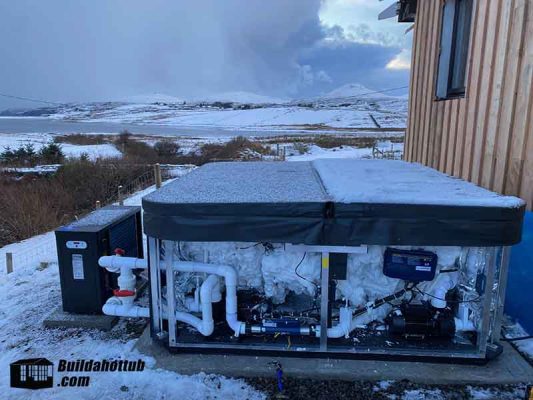
Selecting the right Air Source Heat Pump
There are lots of models available for Air Source Heat Pumps – personally, I have a Comfortline on my own Hot Tub. I bought it because it was cheap. I could have got an “all singing all dancing” heat pump but this fitted my needs, it was cheap and it is fantastic. Saves me a whole bunch of money too.
I have a full review on them here – https://buildahottub.com/comfortline-heat-pump-review/
You can also see above the models in my store – really well priced too!
Select the right “Connection Kit” for your Air Source.
To make things easy, I have put together connection kits to enable you to have all the parts you need to connect an air source to your existing tub. I have three options so measure up the pipes you need as detailed in this article, then you can select the one that meets your needs. Then, select either “regular”, “large” or Extra Large” connection kits. The difference is the amount of pipe and connections you will need.
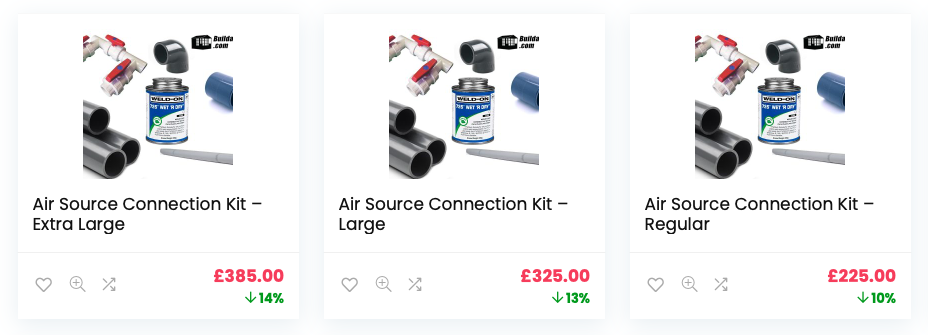
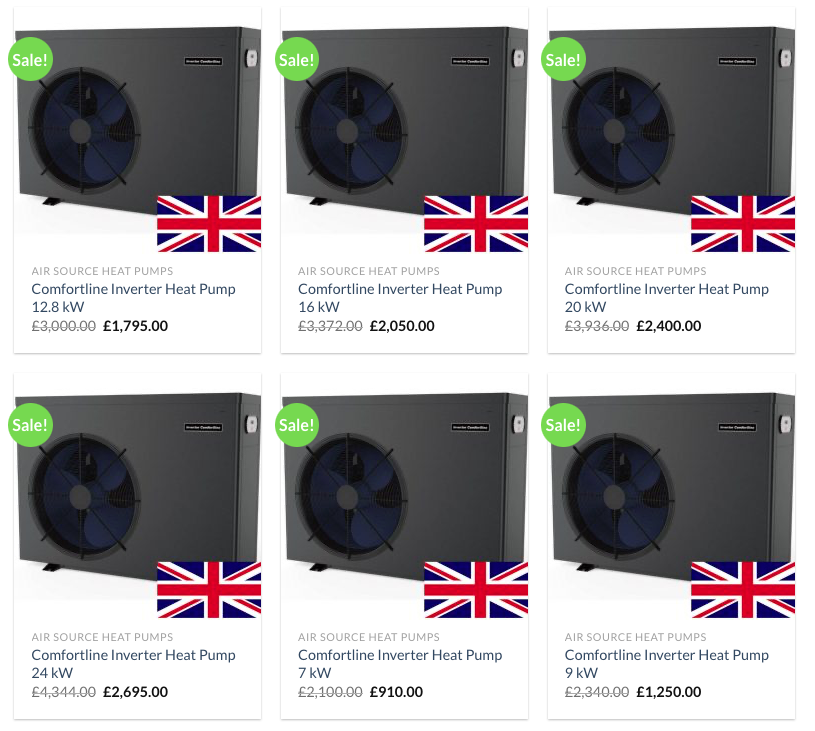
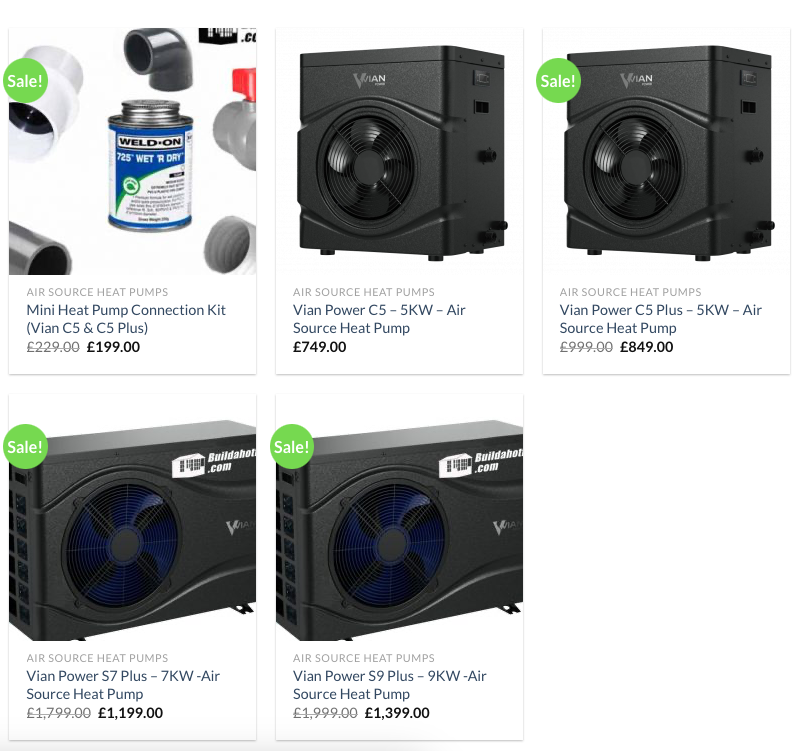
Selecting a Suitable Location for your Air Source
Now, you need to choose a location for your Air Source. It needs to have good air flow all around it so it cannot be encased, covered, underground or up against a wall. It needs roughly 20-30cm all the way around and 2m in front of the fan. Different manufacturers have different guidelines but this is a rough idea for you.
They are not particularly noisy units in general.
You also do not want to be too far away from your tub. Remember, you are adding lengths of pipe to your pump so the flow rates will drop on your circulation. I would try and keep within 5m of your tub if at all possible. Any further, you may need to upgrade your circulation pump to a larger one.
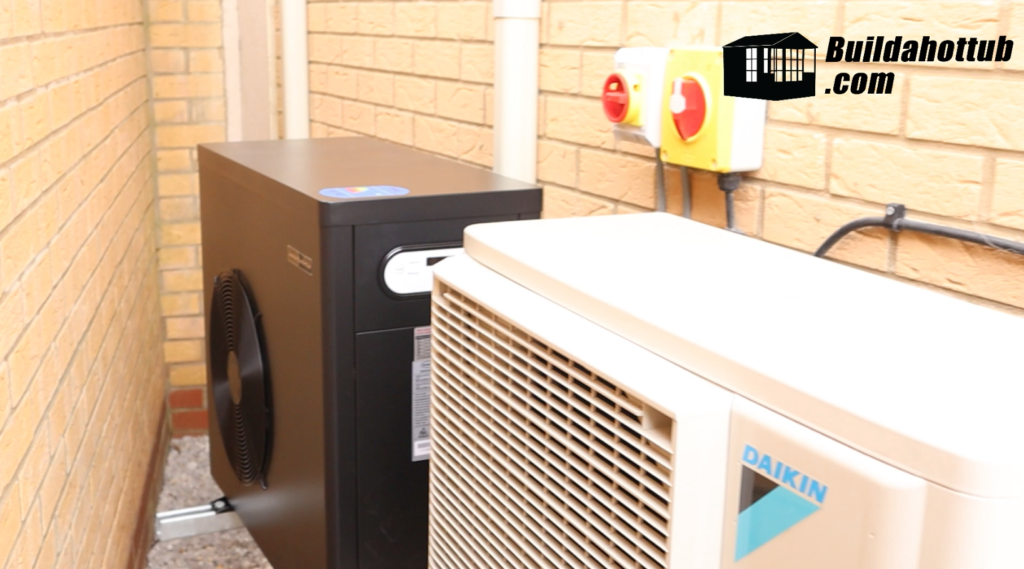
Deciding on a Pipe Run
The next step is to decide on the route the pipe is going to take to and from the hot tub. If you are not laying your pipes on the ground, make sure you support them. Also, try and keep the amount of bends and twists to a minimum.
When you are making a joint, I have a great video below on how to make the perfect pipe joint. Follow this method and you will have no leaks.
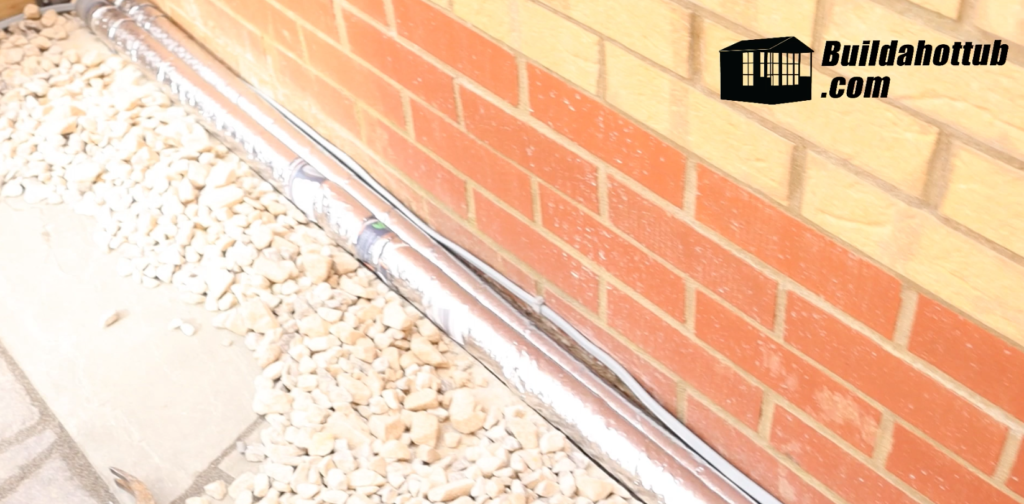


Choosing where to “Cut” the pipes
This is perhaps the part that most of you will be nervous about. Don’t be. It is simple. What you are looking for is the pump that feeds the heater. That means you are looking for the pipe that comes out of the top of the pump and then goes into the Spa Pack. You can then cut this either before of after the spa pack.
From there, you are then going to use some of the 90 degree bends that are in the connection pack to take your pipework out of the hot tub case and over to the heat pump. Simple.
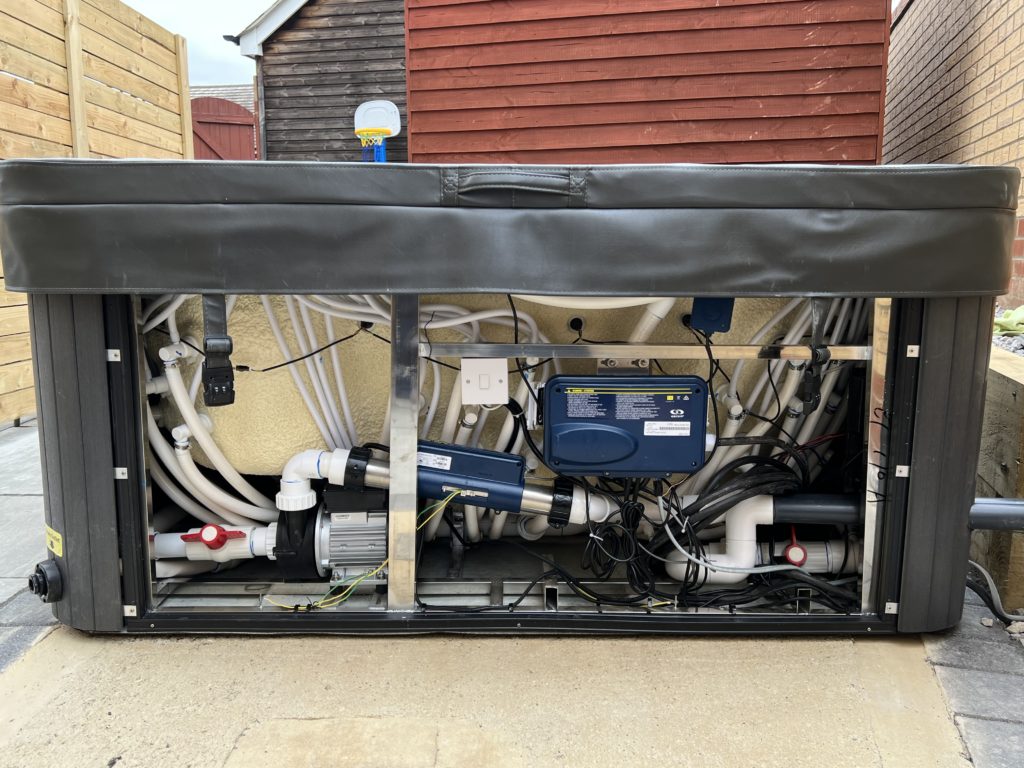
Choosing where to “exit” the Tub Shell
Cutting a hole for your pipes may seem a daunting task as let’s face it, hot tubs are not cheap. With a hole saw, you need to cut a hole so that the 1.5” pipe can come out of the tub.
We are going to use “flexible” pipe to make the connections in the tub and there are 2 x 2m lengths included in the connection kit.
Top tip on the flexible pipe, it is easier to work with when it is warm. So, if you are struggling, pour some hot water on it to soften it up and make it easier to work with.
Connecting Power to the Air Source
Contrary to popular belief, the Air Source is not powered from the Spa Pack. This is however, unless you are buying the Gecko or Balboa heat pumps to match you units (not worth the money to be honest)
Then how are the wired. Simple, regular twin and earth from your mains supply. You can, if you are disconnecting the electric heater, take a feed off the Spa Pack’s main block or from your rotary breaker.
If you are not planning to use the electric heater, then you do not need to upgrade your fuse on the circuit as you are essentially replacing like for like.
If you are planning on using the electric too, then you will need too. You may need to consult an electrician or for those of you that just like doing, adding another 10A is usually enough.
How does it work?
Again, unless you are using the Gecko or Balboa units that tie into your Spa Pack, then you are looking to control you air source with flow. By flow, I mean the water that is being circulated from the circulation pump.
When the Air Source senses flow for a couple of minutes (the Comfortline is 3 mins) then the heater will kick in and start.
The Air Source has an independent temperature from the Spa Pack. Remember, the Spa Pack cannot tell that the electrical heating has been disconnected.
Therefore, it will be “calling for heat” from the electric heater that is not there. The Air Source will kick in and provide the heat.
Downsides of Independent Temperatures?
With this “flow setup” as I like to call it, there are however some small downsides. They are not game changers themselves, but I wanted to make you aware of them.
Firstly, lets take this scenario. You have your heat pump set at 40C / 102F. You are not using your hot tub so you have dropped it down to 30C / 86F. However, every time the spa pack pools the thermostat by running the pump or filtering the water, the heat pump will kick in.
This means that you are heating at times when you technically don’t need to. They are not huge amounts, but they will add a little to the running costs.
This means that the best way to do this is to make sure that the temperature on your tub is exactly the same as the temperature on your air source. If this is the case, then you will not have a problem.
Conclusion
The addition of an air source will no doubt save you money. How much, it is difficult to say but upward of 50% – I have already shared my story and it saves me 66%.
You will get an ROI from your investment at current prices in about 12 months.
The fitting does need some DIY skills but it is pretty straight forward to do – you don’t need to get someone in if you are a confident DIYer to do this.
If I can help in any way or you have any questions, please do get in touch below.
Happy “cheaper” Hot Tubbin
Can I Help You?
If I can help you in any way I would love to hear from you. You can get in touch using the form below.
Thanks - Andi
 Hi, Andi here. I own Buildahottub.com and also write all of the articles and info pages on the site. Some years back now, I built my own hot tub but struggled to find the information I needed. So, once my tub was complete, I started this website to help others in their own pursuit of hot tub and plunge pools DIY building information.
Hi, Andi here. I own Buildahottub.com and also write all of the articles and info pages on the site. Some years back now, I built my own hot tub but struggled to find the information I needed. So, once my tub was complete, I started this website to help others in their own pursuit of hot tub and plunge pools DIY building information.
Fast forward to 2025, I've helped over 1400+ DIY customers just like you all over the world build hot tubs and pools. Have a good look around the site, there are lots of resources here. Please do get in touch if I can help you. - Cheers, Andi

